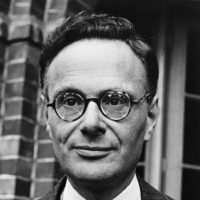
Hans Adolf Krebs
University of Sheffield
For the discovery of the urea and citric acid cycles, which are basic to our understanding of how the body converts food into energy.
The outstanding scientific career of Hans Krebs has been marked by his ability to systematize masses of knowledge according to simple principles.
His first success in this direction was his solution of the problem of urea synthesis in the living cell. Despite the numerous researches on the mechanism of the biosynthesis of urea, it remained for Krebs, in 1932, to propose and prove that urea is formed by a cyclic process. This work was of great importance not only because of the problem it solved, but also because of the originality and elegance of the solution.
In 1938, Krebs developed the concept of another cyclic process to explain the mode of aerobic oxidation of the major dietary constituents. With the development of this concept, known throughout the scientific world as the Krebs citric acid cycle, innumerable isolated and apparently unrelated observations on intermediary metabolism were brought into an understandable pattern, and order was brought out of chaos.
The originality of ideas advanced by Professor Krebs as well as his fruitful research have opened new vistas and paved the way for the solution of fundamental problems of cellular metabolism and for the understanding of disease.
